They have become known as the Angels of Paradise. But there is nothing ethereal about them.
They are online sleuths who know how to find people, and they have been putting their skills to use in the aftermath of California's catastrophic wildfire.
In the dark days that followed the Nov. 8 inferno, the deadliest in California history, social media filled with posts from people trying to contact loved ones from the Paradise area.

In this Wednesday, Dec. 5, 2018, photo, Dawn Kosmakos, left, and Nancy Collins pose for a photo in Concord, Calif. Collins, a 911 dispatcher, and Kosmakos are volunteers known as "search angels" to help adopted people find their biological parents. In the aftermath of Northern California's catastrophic wildfire, social media sites filled with posts from people trying to find loved ones in and near the town of Paradise. A group of women scattered across the U.S. knew they could help. The women volunteer as "search angels, " those who help adoptees find their biological parents. So far, they have tracked down nearly 250 people and linked them with friends and family who were looking for them becoming known as the Angels of Paradise. (AP PhotoBen Margot)
Panic spread as the magnitude of destruction came into focus: At least 85 dead. Nearly 14,000 homes destroyed. From across the U.S., people posted names of aunts, uncles, foster parents, distant relatives and long-lost friends or acquaintances and asked, "Does anyone know if they are safe?"
Nancy Collins knew she could help. A mother of two and a 911 dispatcher, Collins volunteers as a "search angel," someone who helps adoptees find their biological parents. She knows her way around public records and how to track people down.
She offered her services to the administrator of a newly created Facebook page, "Camp Fire Missing Persons, Paradise CA," after noticing panicked posts were piling up.
"I said, 'I have a bunch of genealogy friends, and we can help," said Collins, who lives in the San Francisco Bay Area and formed a team of eight "angels" from around the country and one in Canada, all of whom volunteer with a group called Search Squad . "The rest was history."
Working on laptops from their living room sofas, home offices and kitchen counters, they communicated in online chat groups and divvied up hundreds of posts. They used public databases to find property deeds, court records and bankruptcy filings, and logged onto people-finding sites like Ancestry.com, BeenVerified.com, the online White Pages and others. They looked for cellphone numbers and email addresses and names of friends, relatives, neighbors and associates who might have clues.
In the four weeks since the fire started, the search angels have connected nearly 250 people with the relatives and friends they were searching for. They are one of several missing persons groups that sprung up on Facebook with the intention of helping strangers in a time of need, harnessing the power of social media and dogged investigative work.
"I reached out to the angels, and they really are angels," said Delisa Gaeta, 55, who was concerned about her foster father, whom she hadn't seen in years. "I threw a lifeline out there, and they grabbed hold of it and reeled it in. They just made it happen."
At first, Gaeta didn't know if her foster father, Dale Wingett, had made it out of his Paradise home alive. Authorities had no information on him, and after two weeks of trying to contact him, she was losing hope. Then she saw his picture in a local newspaper at a Thanksgiving dinner for survivors in the Northern California city of Redding. Gaeta desperately wanted to speak to Wingett and see if he needed help.
"It became a group project," said Dawn Kosmakos, a search angel who lives in Martinez, in the San Francisco Bay Area. "It was like, 'OK, girls. Let's find him!"
They alerted the sheriff's office, did online searches and tried calling family and a property management company, Collins said. They found out Wingett had left Redding and was heading about 80 miles (130 kilometers) south, to the city of Willows.
"We called every hotel in Willows and said, 'If he checks in, can you give him this message?'" said Collins, and that's how they found him. Wingett got the message, called them back, got Gaeta's number and called her. They have since emailed and spoken several times.
For Wingett, the connection brought happiness at a time of great loss.
"We have had really moving talks," said Wingett, contacted by phone at a hotel in Sutter Creek. "She told me that even though I was her foster father, to her I was her father. That hit me pretty strongly."
Gaeta says she has peace of mind after weeks of sleepless nights.
"I am so grateful to the work of these women," said Gaeta, who lives in the Bay Area city of Santa Clara. "They gave me the best Christmas gift."
Diana Sauer, 39, feels a similar sense of gratitude and wonder for the work of the angels, who use methods for finding people that many don't know exist.
"I owe them everything," said Sauer, who lives in the San Francisco area but grew up in Paradise and was worried about her father's best friend, Russell Anderson. "I don't think I would have found him without them."
Anderson is 70 and lived simply, she said, with no cellphone or internet.
"It made him one of those very difficult people to find," said Sauer, who knew Anderson had no children but was close with his ex-wife's daughter, Charmaine. Sauer did not know Charmaine's last name, but the angels found her.
"They ended up finding Charmaine's marriage record, then they found birth records showing she had children. They found her children on Facebook and asked, 'Do you know Russell, and is he with you?'"
The answer was yes. She spoke to Anderson on the phone for 40 minutes, and caught him up on her life, her marriage, her own children. They hadn't spoken in 15 years. "It was a very sweet conversation between two people that love each other and haven't seen each other in a long time."
Several people that Collins' group tracked down appeared on the official list of people unaccounted for after the fire. That list, managed by the Butte County Sheriff's Office, is down to six names from a high of 1,300 last month.
Sheriff Kory Honea acknowledged the work of Facebook groups in the effort but said his agency wasn't coordinating with them or using their resources, primarily because it was so swamped with other work.
"If the Facebook group knows that (people) are safe, they should call us and let us know. There's no way my staff can check the myriad of Facebook pages," Honea told The Associated Press.
Collins said when her team located a "missing" person who was on the official list, they emailed the sheriff's office and also told friends and family of those found to contact the sheriff's office to have their names removed.
Susie Elliot, 63, tried to get official information about her cousin in Paradise, Dee Riley, but called the sheriff's office and got repeated busy signals.
For over two weeks, Elliot, who lives in San Dimas, near Los Angeles, checked everywhere she could think of for Riley. She contacted the Red Cross, which was running shelters for fire evacuees, and it had no record of Riley so directed her to the Butte County Sheriff's Office, where she couldn't get through. She learned Riley's house burned down and started getting anxious. Then she did a Google search using words like, "missing people in Paradise," and found the Facebook group.
On Nov. 27, Elliot posted a message to the group saying she couldn't find her cousin. Within minutes, Kosmakos was on the case. Kosmakos, a stay-at-home mom and part-time administrative assistant, said she found Riley's cellphone number after a few quick online searches.
"By 3 p.m. the next day, I was in touch with my cousin," said Elliot, who learned her cousin was safe and was renting an apartment near Sacramento.
"I couldn't believe they found her in less than 24 hours," Elliot said.
The angels say they all have personal reasons for doing the work they do.
"I was in a foster home myself. I really don't have much family," said Collins. "So, for me, I get joy connecting others to their family."
VENICE, Italy (AP) — Under the gaze of the world’s media, the fragile lagoon city of Venice launches a pilot program Thursday to charge day-trippers a 5-euro (around $5.35) entry fee that authorities hope will discourage visitors from arriving on peak days and make the city more livable for its dwindling residents.
Signs advising arriving visitors of the new requirement for a test phase of 29 days through July have been erected outside the main train station and other points of arrival.
Some 200 stewards have been trained to politely walk anyone unaware of the fee through the process of downloading a QR code. A kiosk has been set up for those not equipped with a smartphone. Once past designated entry ports, officials will carry out random checks for QR codes that show the day-tripper tax has been paid or that the bearer is exempt.
Transgressors face fines 50 euros to 300 euros. The requirement applies only for people arriving between 8:30 a.m. and 4 p.m. Outside of those hours, access is free.
“We need to find a new balance between the tourists and residents,’’ said the city’s top tourism official, Simone Venturini. “We need to safeguard the spaces of the residents, of course, and we need to discourage the arrival of day-trippers on some particular days.”
Venice has long suffered under the pressure of over-tourism, but officials say that pre-pandemic estimates ranging from 25 million to 30 million visitors a year — including day-trippers — are not reliable and that the pilot project also aims to come up with more exact figures to help better manage the phenomenon.
By contrast, registered visitors spending the night last year numbered 4.6 million, according to city figures, down 16% from pre-pandemic highs.
Venturini said the city is strained when the number of day-trippers reaches 30,000 to 40,000. Its narrow alleyways are clogged with people and water taxis packed, making it difficult for residents to go about their business.
Not all residents, however, are persuaded of the efficacy of the new system in dissuading mass tourism, and say more attention needs to be paid to boosting the resident population and services they need.
Venice last year passed a telling milestone when the number of tourist beds exceeded for the first time the number of official residents, which is now below 50,000 in the historic center with its picturesque canals.
“Putting a ticket to enter a city will not decrease not even by one single unit the number of visitors that are coming,’’ said Tommaso Cacciari, an activist who organized a protest Thursday against the measure.
“You pay a ticket to take the metro, to go to a museum, an amusement park; you don’t pay a ticket to enter a city. This is the last symbolic step of a project of an idea of this municipal administration to kick residents out of Venice,” he said.
Venturini said about 6,000 people had already paid to download the QR code, and officials expect paid day-tripper arrivals Thursday to reach some 10,000.
More than 70,000 others have downloaded a QR code denoting an exemption, including to work in Venice or as a resident of the Veneto region. People staying in hotels in Venice, including in mainland districts like Marghera or Mestre, should also get a QR code attesting to their stay, which includes a hotel tax.
The tourist official says interest in Venice's pilot program has been keen from other places suffering from mass tourism, including other Italian art cities and cities abroad such as Barcelona and Amsterdam.
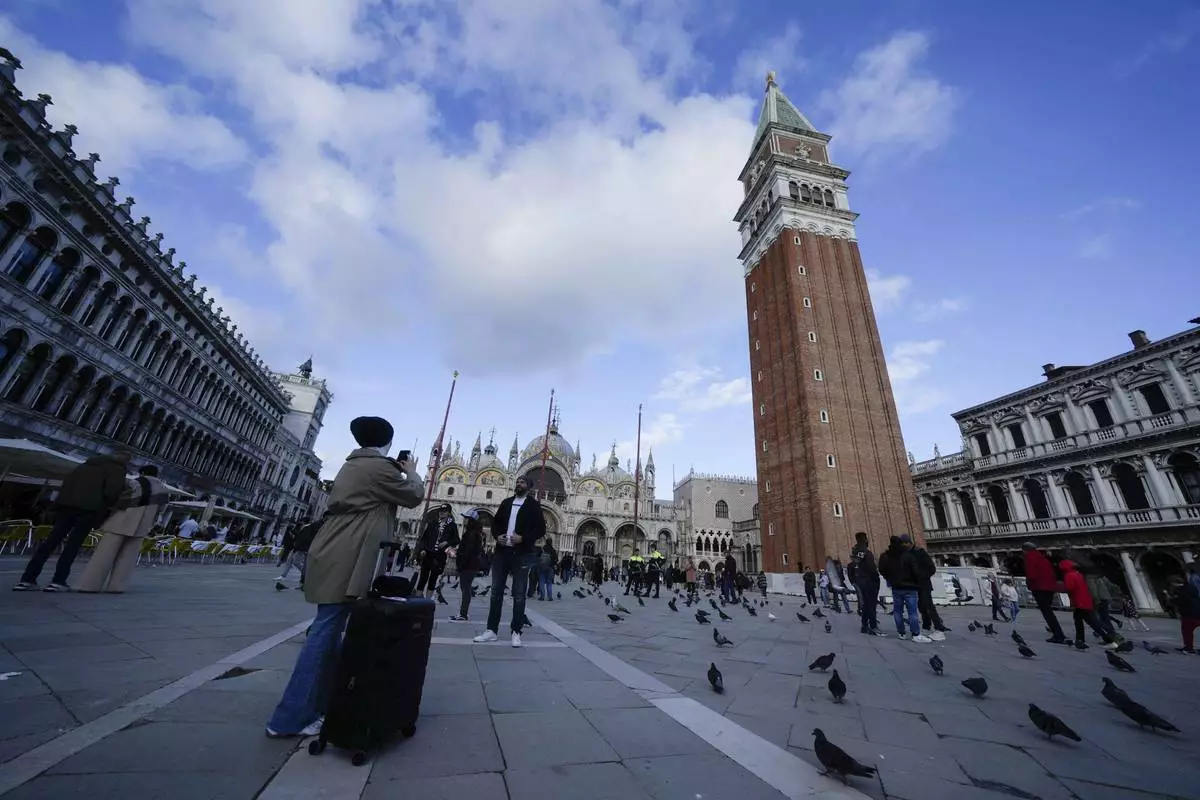
Tourists take pictures at the St. Mark square in Venice, Italy, Wednesday, April 24, 2024. The lagoon city of Venice begins a pilot program Thursday, April 25, 2024 to charge daytrippers a 5 euro entry fee that authorities hope will discourage tourists from arriving on peak days. Officials expect some 10,000 people will pay the fee to access the city on the first day, downloading a QR code to prove their payment. (AP Photo/Luca Bruno)
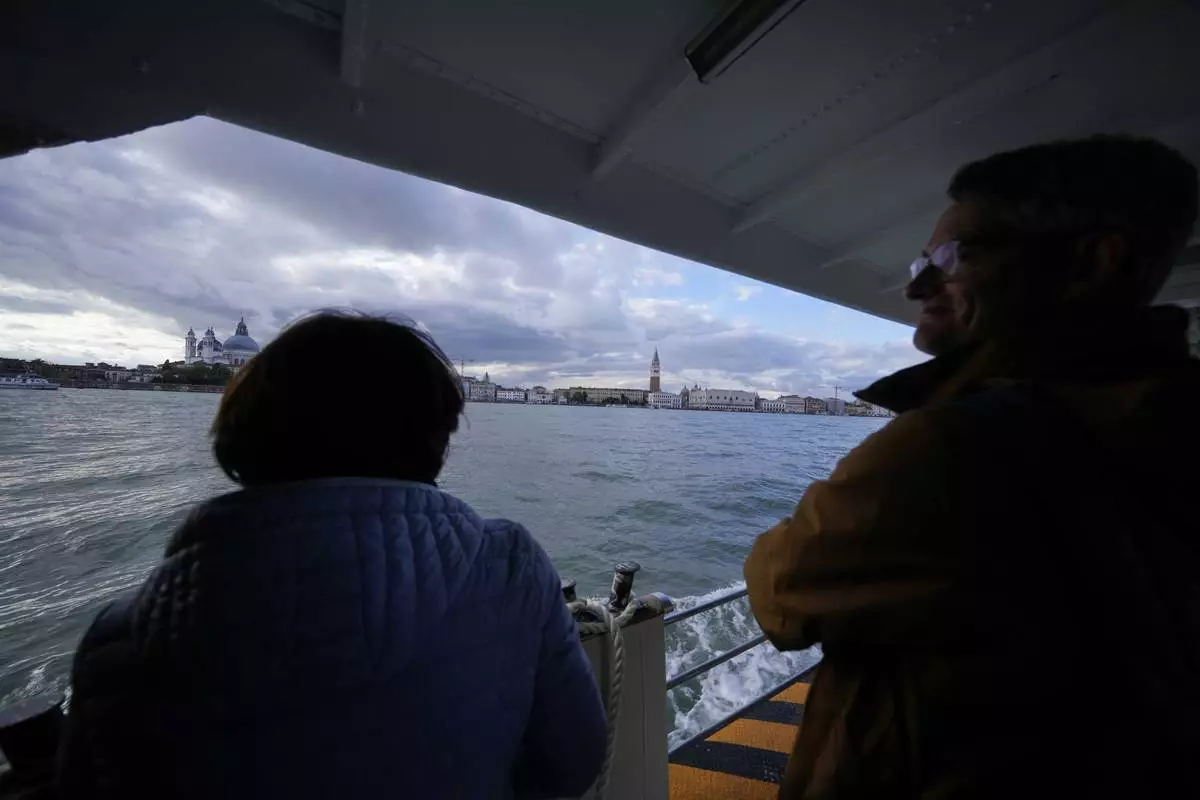
Tourists ride on a ferry boat in Venice, Italy, Wednesday, April 24, 2024. The lagoon city of Venice begins a pilot program Thursday, April 25, 2024 to charge daytrippers a 5 euro entry fee that authorities hope will discourage tourists from arriving on peak days. Officials expect some 10,000 people will pay the fee to access the city on the first day, downloading a QR code to prove their payment. (AP Photo/Luca Bruno)
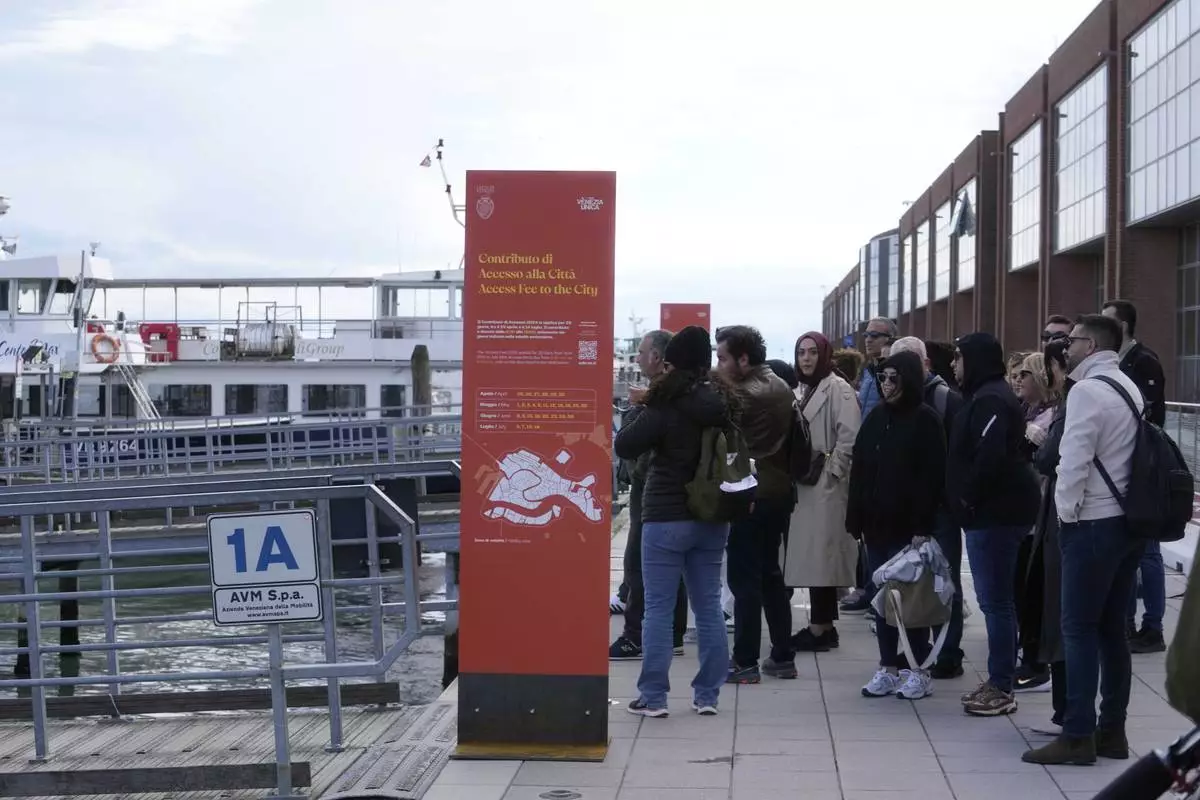
People stand in front of an information board explaining how to pay the tourist tax in Venice, Italy, Wednesday, April 24, 2024. The lagoon city of Venice begins a pilot program Thursday, April 25, 2024 to charge daytrippers a 5 euro entry fee that authorities hope will discourage tourists from arriving on peak days. Officials expect some 10,000 people will pay the fee to access the city on the first day, downloading a QR code to prove their payment. (AP Photo/Luca Bruno)
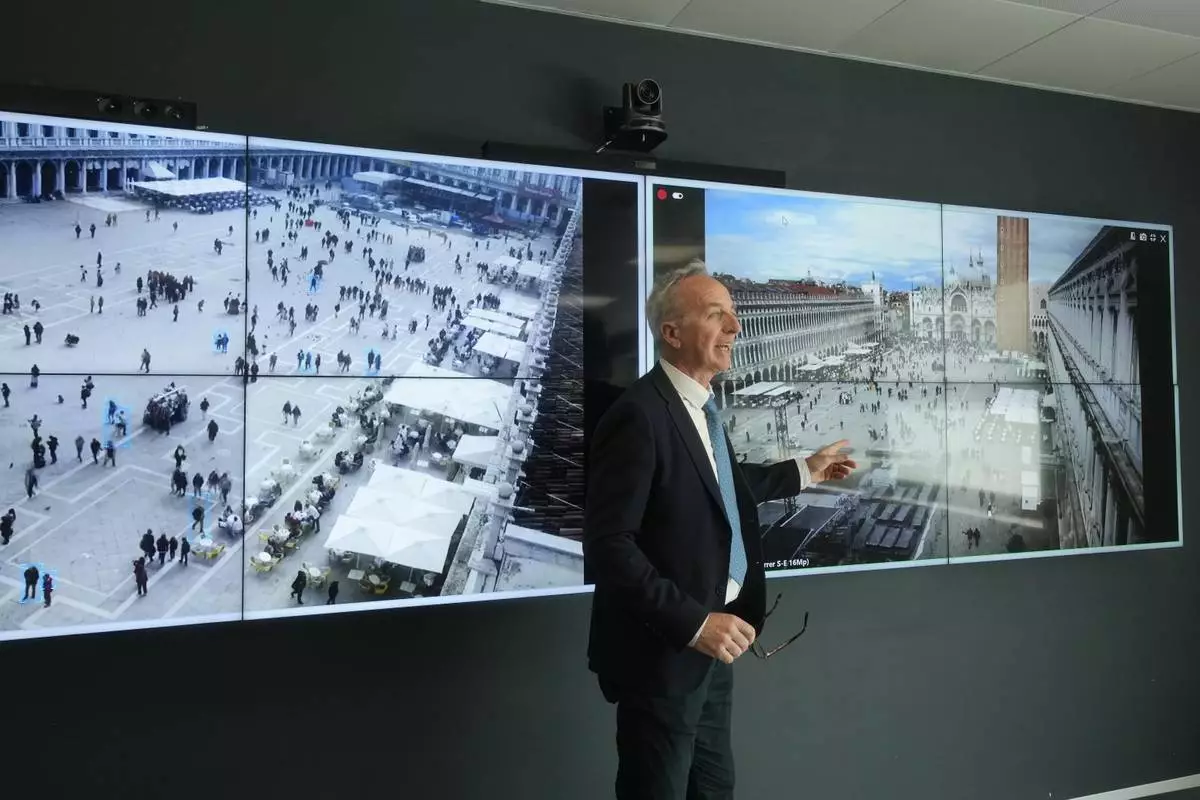
Marco Bettini, director of Venis Informatics System, gestures as he talks to reporters at the police Venice control room, in Venice, Italy, Wednesday, April 24, 2024. The lagoon city of Venice begins a pilot program Thursday, April 25, 2024 to charge daytrippers a 5 euro entry fee that authorities hope will discourage tourists from arriving on peak days. Officials expect some 10,000 people will pay the fee to access the city on the first day, downloading a QR code to prove their payment. (AP Photo/Luca Bruno)
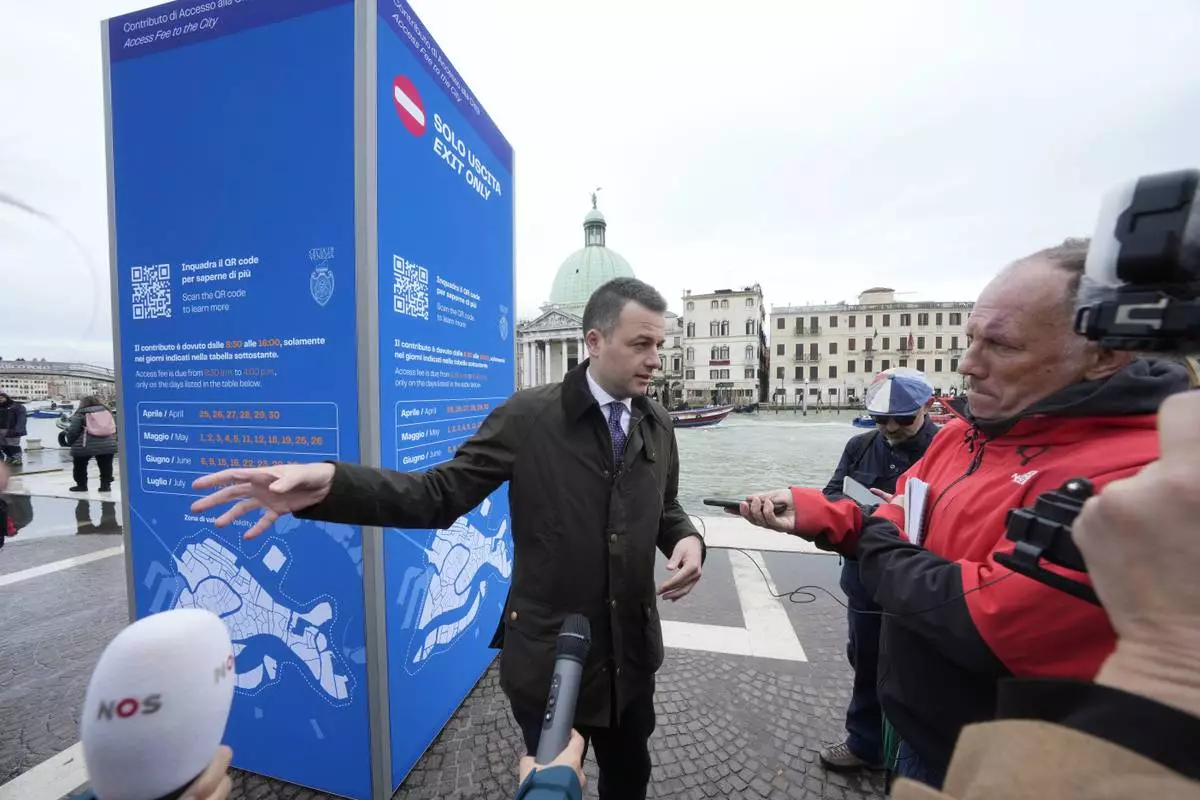
Venice councillor Simone Venturini speaks with reporters in front of a tourist tax totem in Venice, Italy, Wednesday, April 24, 2024. The lagoon city of Venice begins a pilot program Thursday, April 25, 2024 to charge daytrippers a 5 euro entry fee that authorities hope will discourage tourists from arriving on peak days. Officials expect some 10,000 people will pay the fee to access the city on the first day, downloading a QR code to prove their payment. (AP Photo/Luca Bruno)
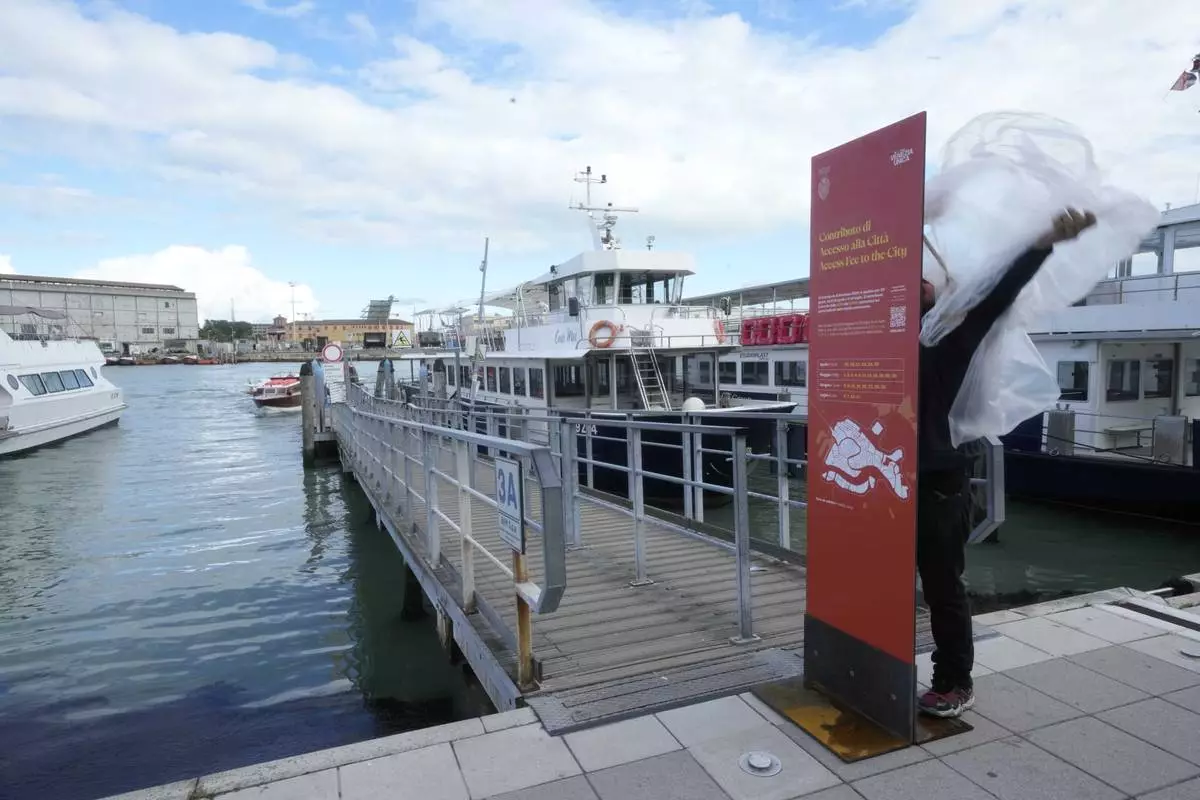
Workers prepare banner explaining how to pay the tourist tax in Venice, Italy, Wednesday, April 24, 2024. The lagoon city of Venice begins a pilot program Thursday, April 25, 2024 to charge daytrippers a 5 euro entry fee that authorities hope will discourage tourists from arriving on peak days. Officials expect some 10,000 people will pay the fee to access the city on the first day, downloading a QR code to prove their payment. (AP Photo/Luca Bruno)
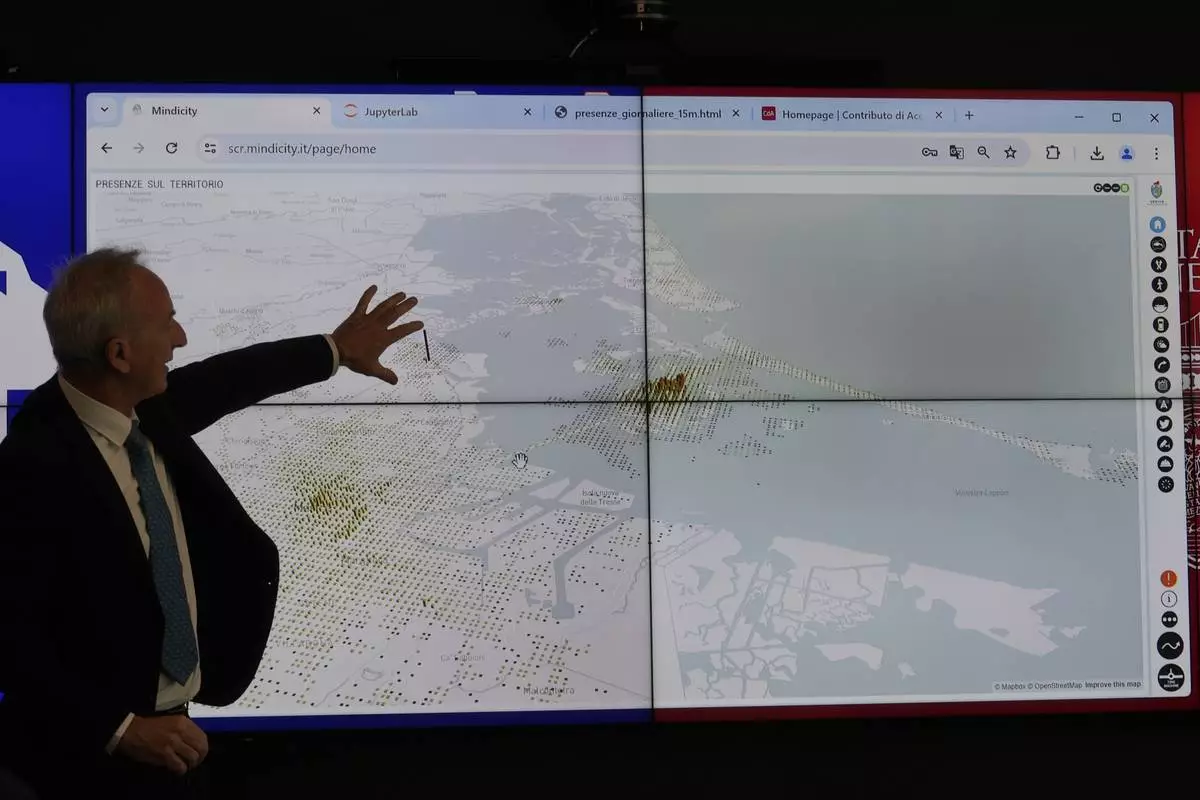
Marco Bettini, director of Venis Informatics System, gestures as he explains the Venice density to reporters at the police Venice control room in Venice, Italy, Wednesday, April 24, 2024. The lagoon city of Venice begins a pilot program Thursday, April 25, 2024 to charge daytrippers a 5 euro entry fee that authorities hope will discourage tourists from arriving on peak days. Officials expect some 10,000 people will pay the fee to access the city on the first day, downloading a QR code to prove their payment. (AP Photo/Luca Bruno)
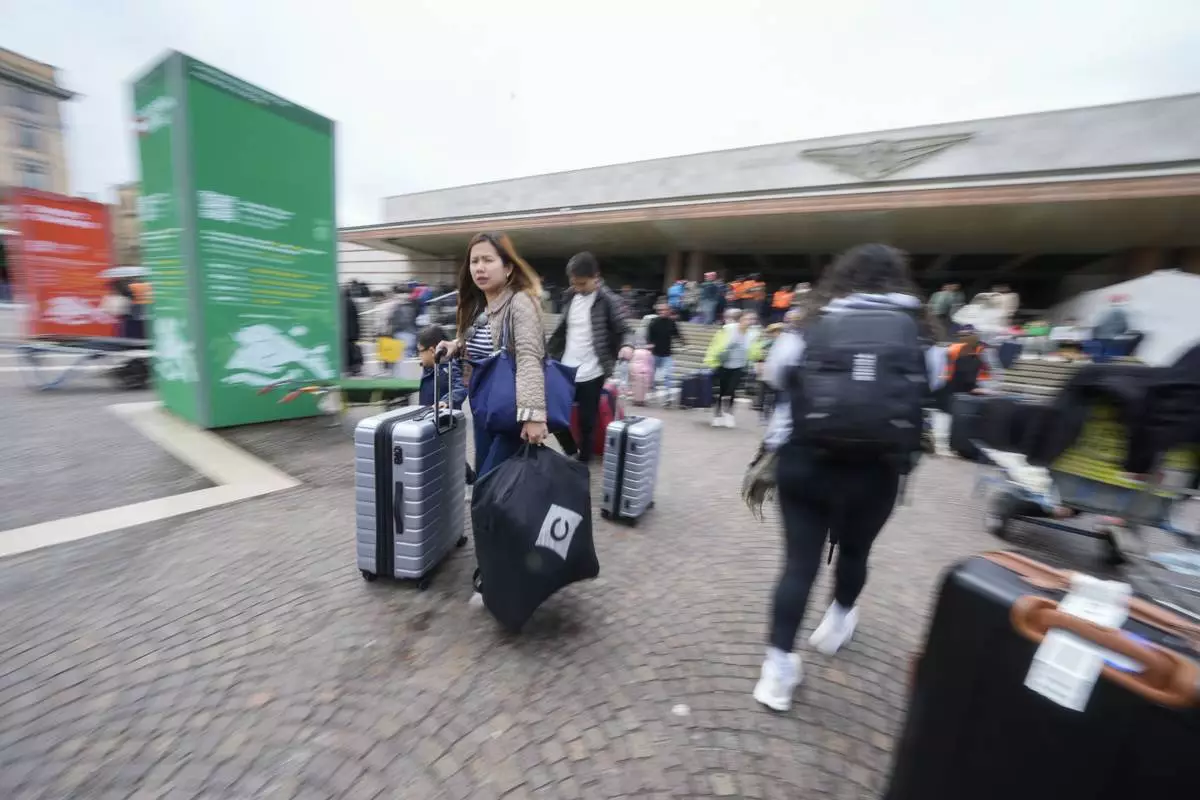
Tourists arrive at the main train station in Venice, Italy, Wednesday, April 24, 2024. The lagoon city of Venice begins a pilot program Thursday, April 25, 2024 to charge daytrippers a 5 euro entry fee that authorities hope will discourage tourists from arriving on peak days. Officials expect some 10,000 people will pay the fee to access the city on the first day, downloading a QR code to prove their payment. (AP Photo/Luca Bruno)
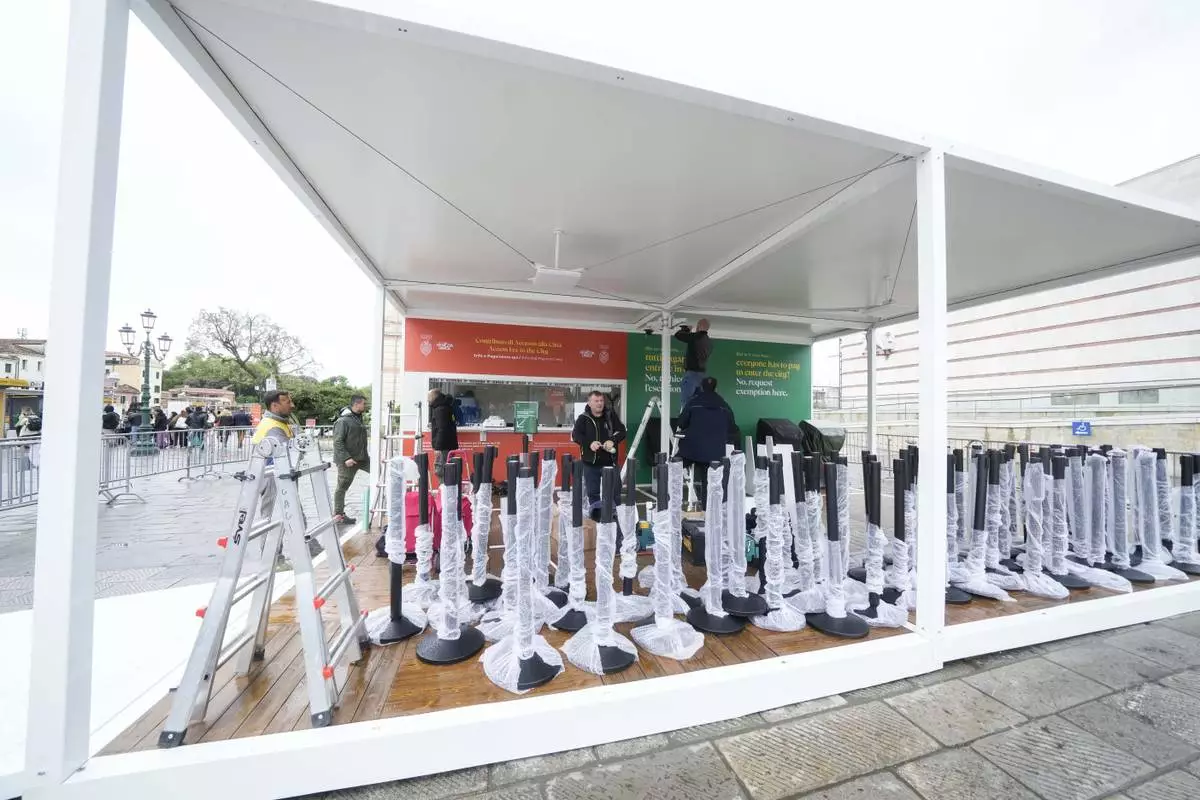
Workers prepare the tourist tax cashier desks outside the main train station in Venice, Italy, Wednesday, April 24, 2024. The lagoon city of Venice begins a pilot program Thursday, April 25, 2024 to charge daytrippers a 5 euro entry fee that authorities hope will discourage tourists from arriving on peak days. Officials expect some 10,000 people will pay the fee to access the city on the first day, downloading a QR code to prove their payment. (AP Photo/Luca Bruno)
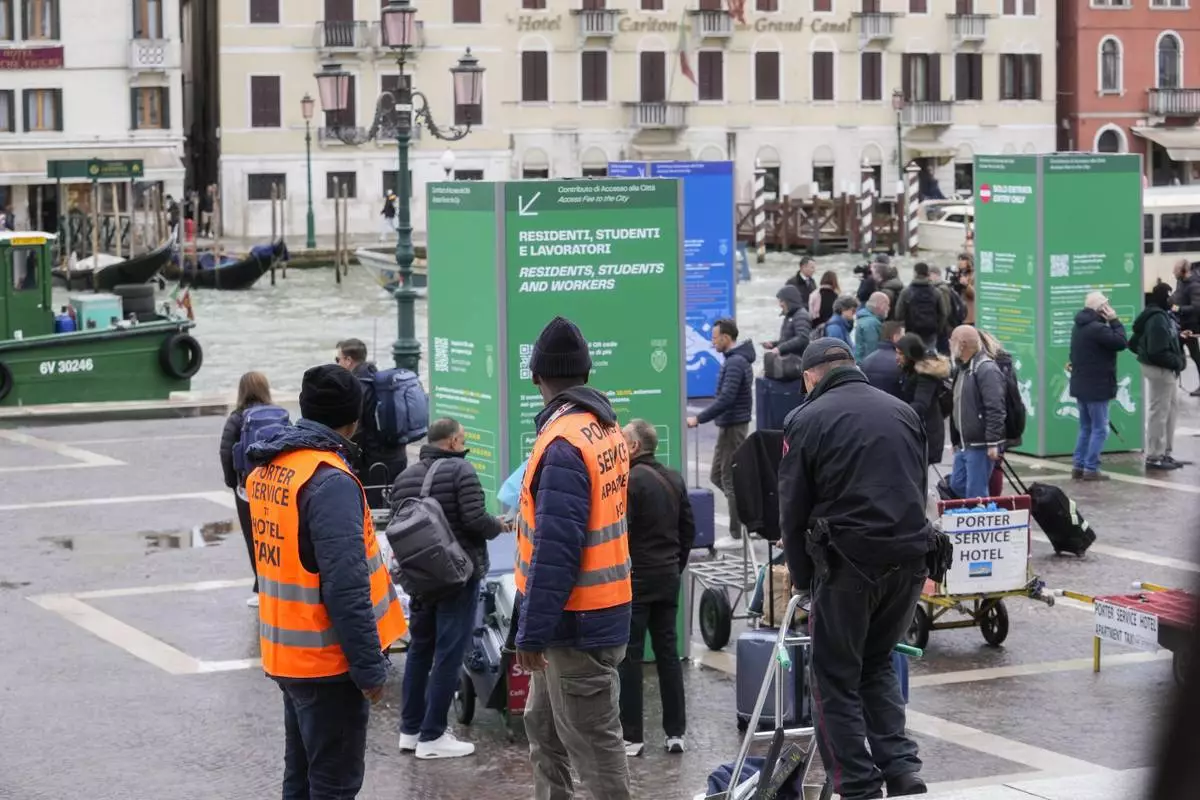
Porters wait for tourists outside the main train station in Venice, Italy, Wednesday, April 24, 2024. The lagoon city of Venice begins a pilot program Thursday, April 25, 2024 to charge daytrippers a 5 euro entry fee that authorities hope will discourage tourists from arriving on peak days. Officials expect some 10,000 people will pay the fee to access the city on the first day, downloading a QR code to prove their payment. (AP Photo/Luca Bruno)
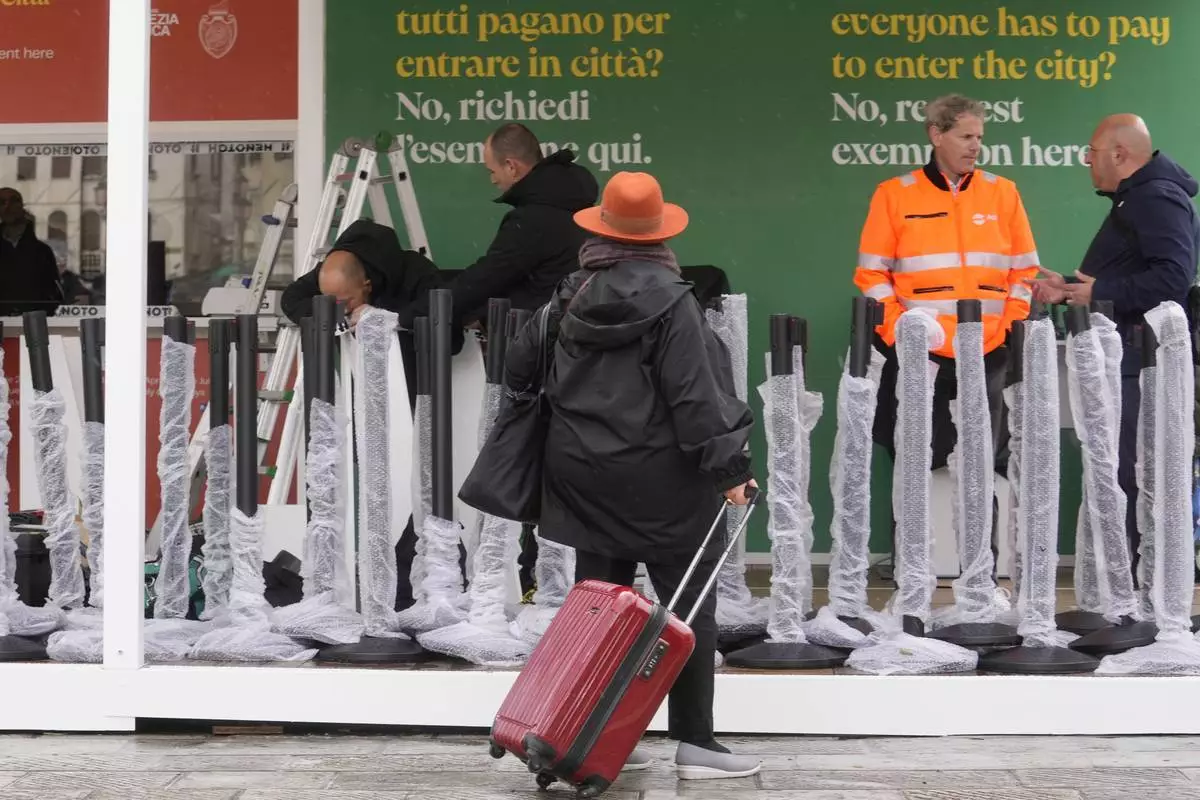
Workers prepare the tourist tax cashier desks outside the main train station in Venice, Italy, Wednesday, April 24, 2024. The lagoon city of Venice begins a pilot program Thursday, April 25, 2024 to charge daytrippers a 5 euro entry fee that authorities hope will discourage tourists from arriving on peak days. Officials expect some 10,000 people will pay the fee to access the city on the first day, downloading a QR code to prove their payment. (AP Photo/Luca Bruno)
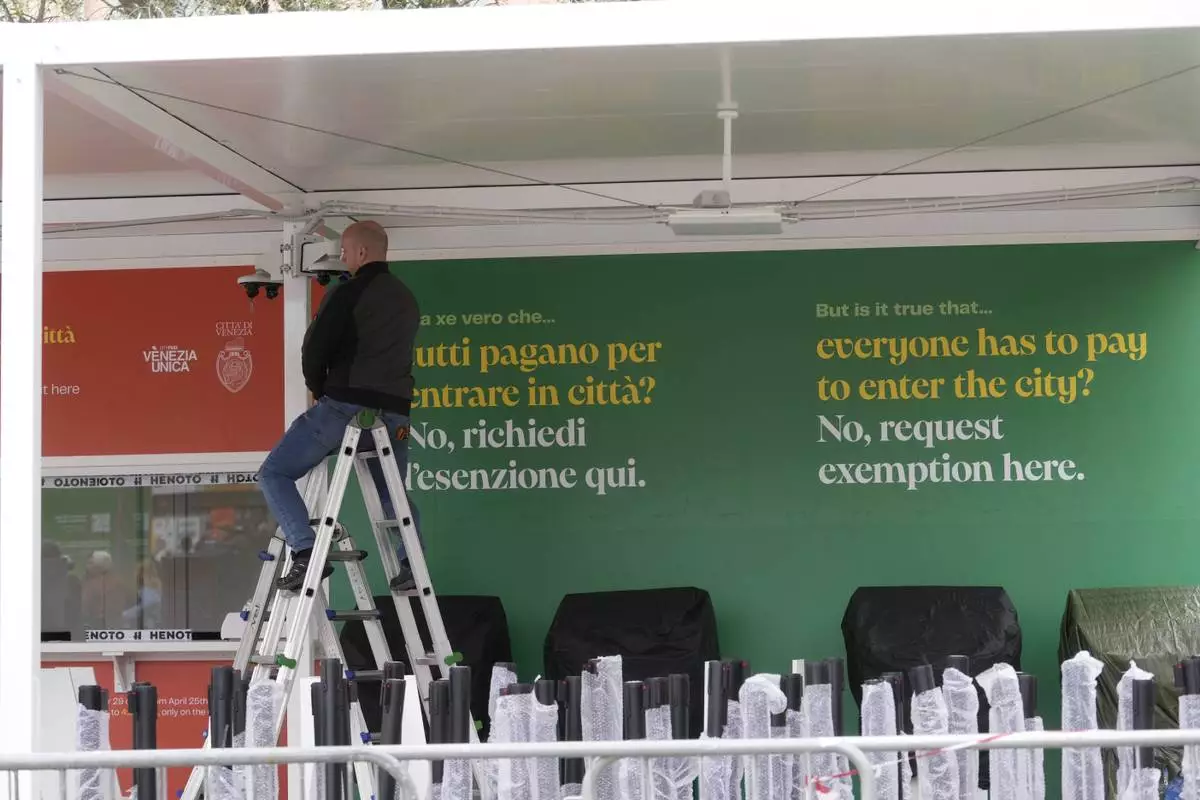
Workers prepare the tourist tax cashier desks outside the main train station in Venice, Italy, Wednesday, April 24, 2024. The lagoon city of Venice begins a pilot program Thursday, April 25, 2024 to charge daytrippers a 5 euro entry fee that authorities hope will discourage tourists from arriving on peak days. Officials expect some 10,000 people will pay the fee to access the city on the first day, downloading a QR code to prove their payment. (AP Photo/Luca Bruno)
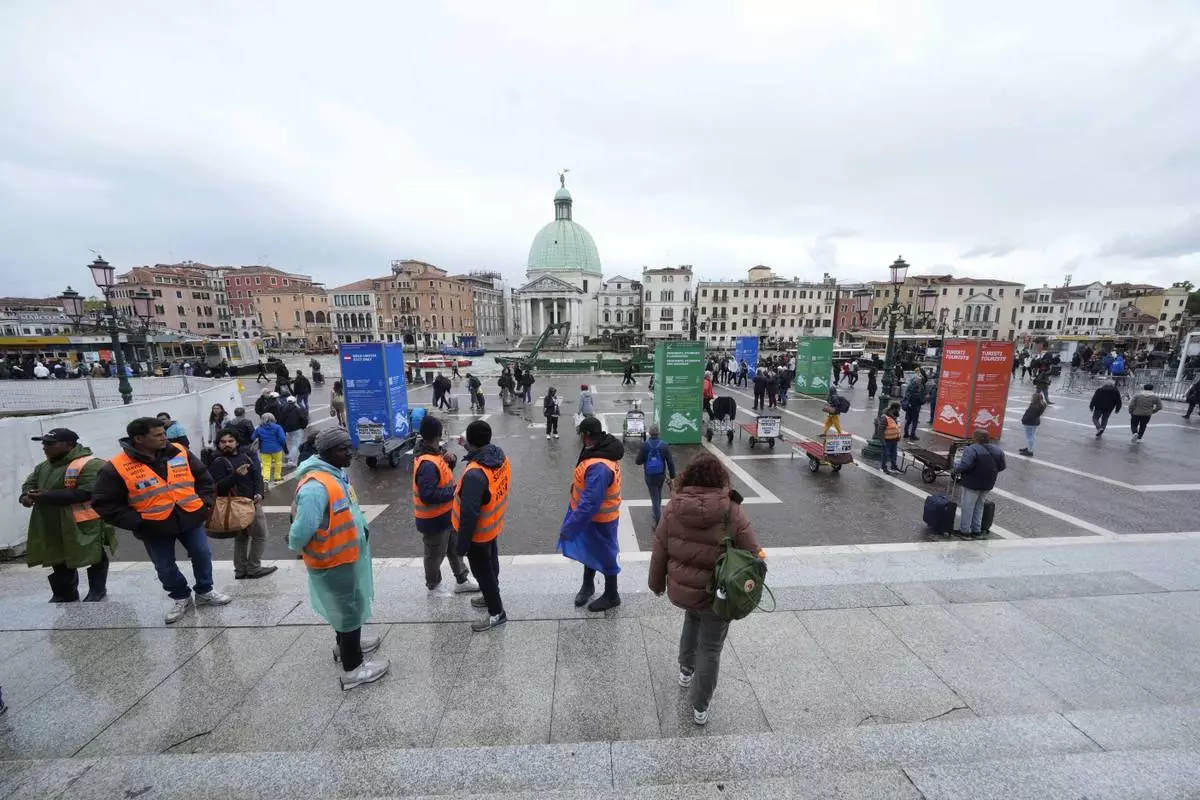
Porters wait for tourists outside the main train station in Venice, Italy, Wednesday, April 24, 2024. The lagoon city of Venice begins a pilot program Thursday, April 25, 2024 to charge daytrippers a 5 euro entry fee that authorities hope will discourage tourists from arriving on peak days. Officials expect some 10,000 people will pay the fee to access the city on the first day, downloading a QR code to prove their payment. (AP Photo/Luca Bruno)
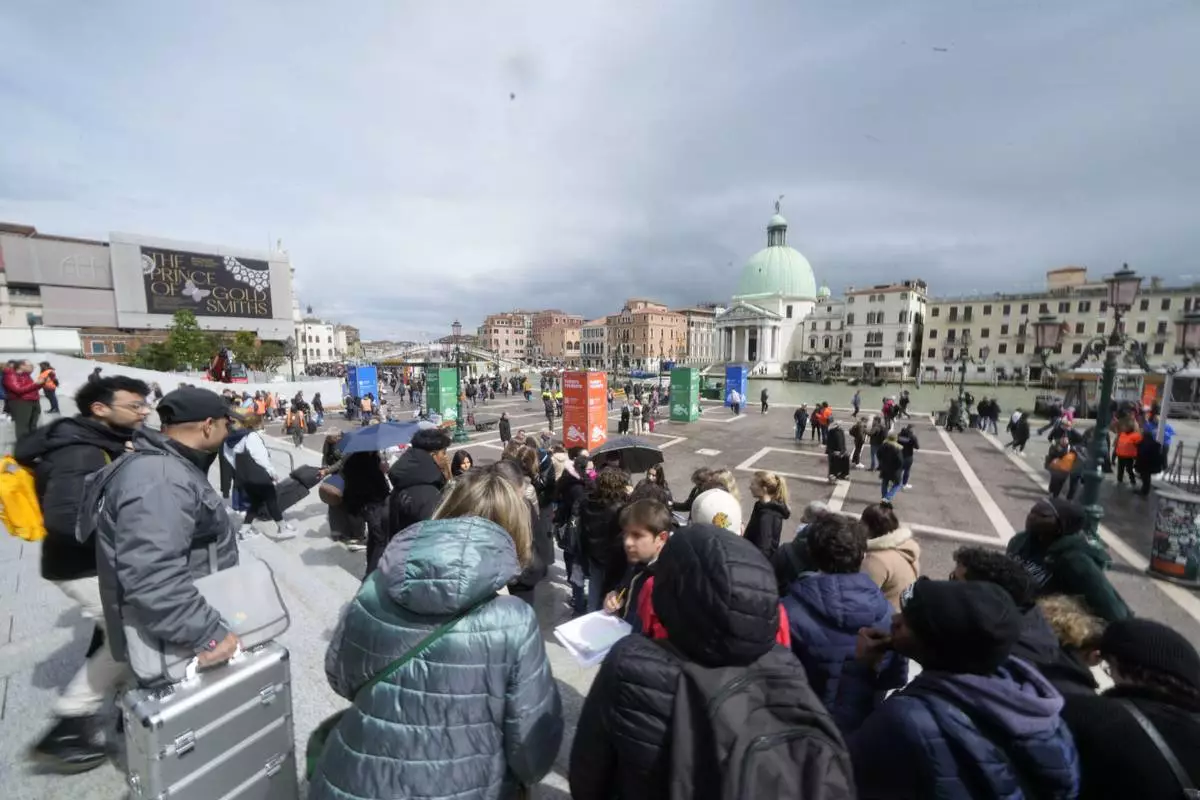
Tourists arrive outside the main train station in Venice, Italy, Wednesday, April 24, 2024. The lagoon city of Venice begins a pilot program Thursday, April 25, 2024 to charge daytrippers a 5 euro entry fee that authorities hope will discourage tourists from arriving on peak days. Officials expect some 10,000 people will pay the fee to access the city on the first day, downloading a QR code to prove their payment. (AP Photo/Luca Bruno)
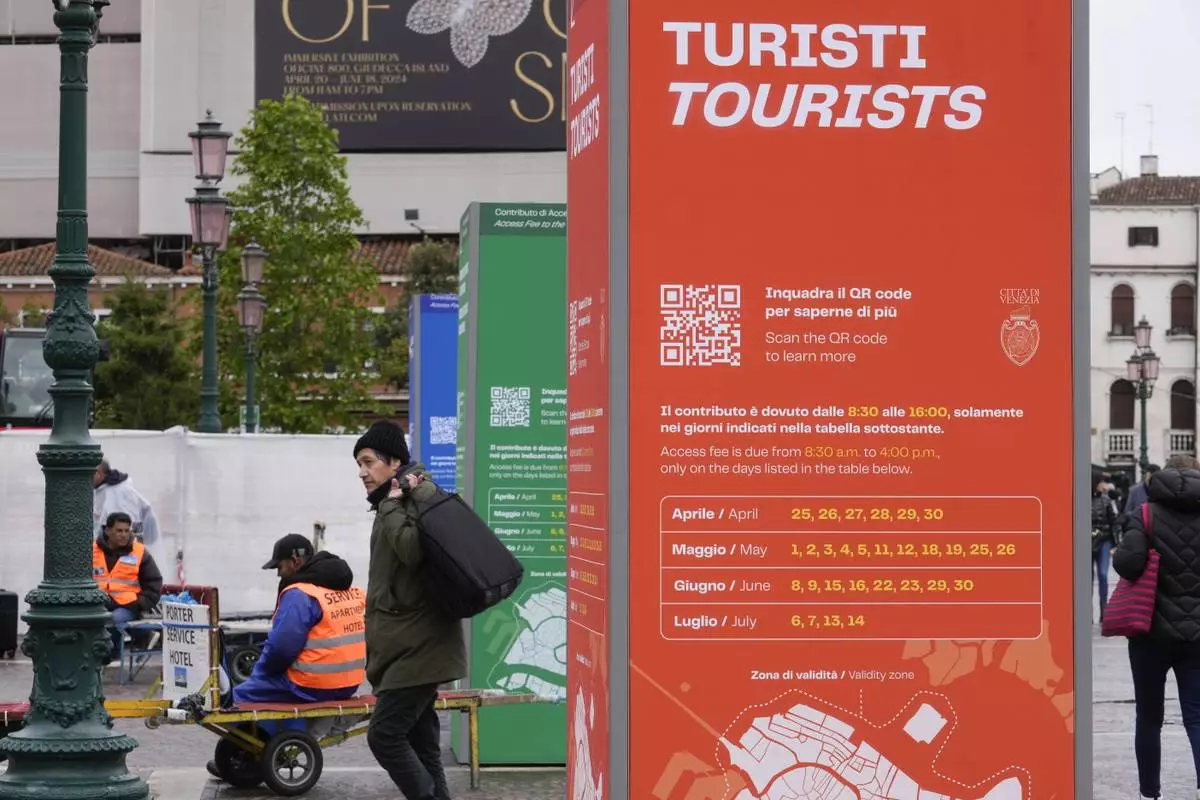
Tourist information boards are seen outside the main train station in Venice, Italy, Wednesday, April 24, 2024. The lagoon city of Venice begins a pilot program Thursday, April 25, 2024 to charge daytrippers a 5 euro entry fee that authorities hope will discourage tourists from arriving on peak days. Officials expect some 10,000 people will pay the fee to access the city on the first day, downloading a QR code to prove their payment. (AP Photo/Luca Bruno)
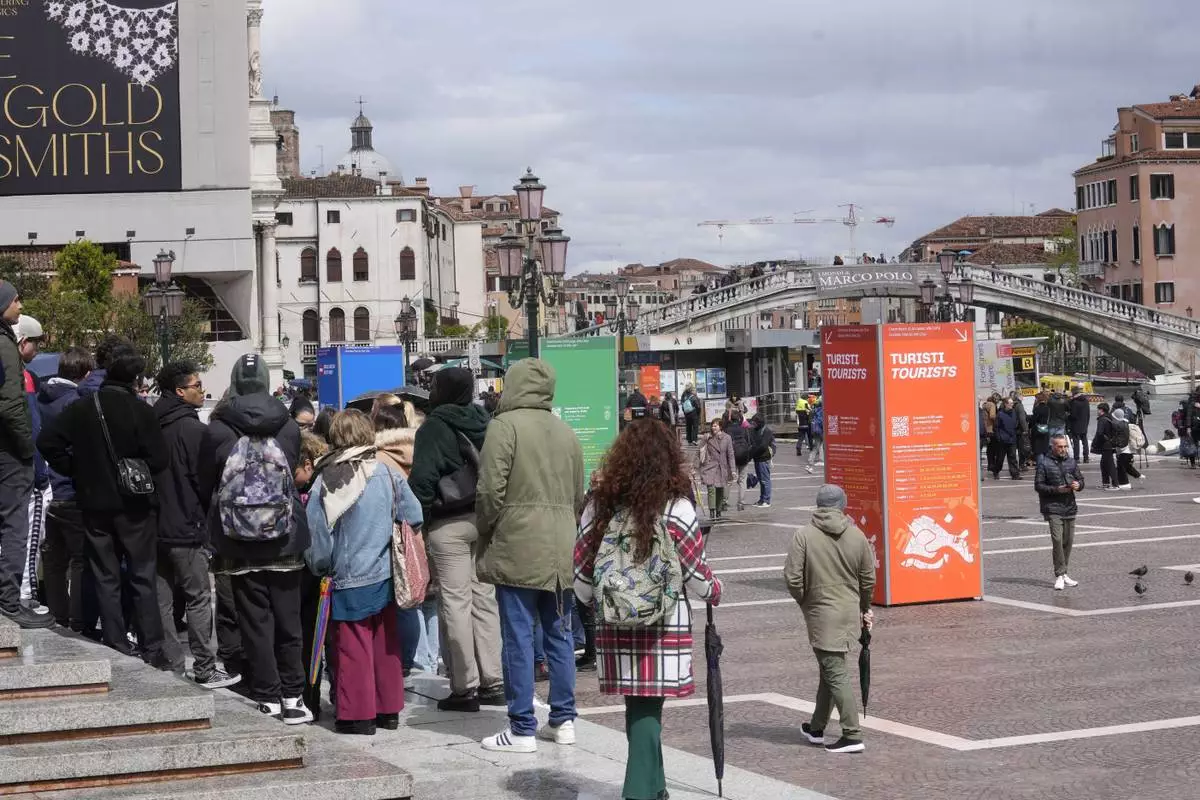
Tourists arrive outside the main train station in Venice, Italy, Wednesday, April 24, 2024. The lagoon city of Venice begins a pilot program Thursday, April 25, 2024 to charge daytrippers a 5 euro entry fee that authorities hope will discourage tourists from arriving on peak days. Officials expect some 10,000 people will pay the fee to access the city on the first day, downloading a QR code to prove their payment. (AP Photo/Luca Bruno)


























